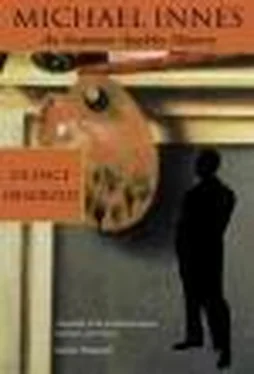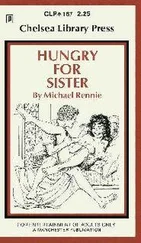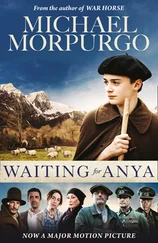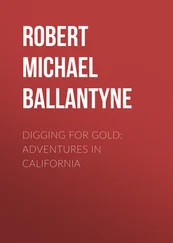Michael Innes - Lament for a Maker
Здесь есть возможность читать онлайн «Michael Innes - Lament for a Maker» весь текст электронной книги совершенно бесплатно (целиком полную версию без сокращений). В некоторых случаях можно слушать аудио, скачать через торрент в формате fb2 и присутствует краткое содержание. Жанр: Старинная литература, на английском языке. Описание произведения, (предисловие) а так же отзывы посетителей доступны на портале библиотеки ЛибКат.
- Название:Lament for a Maker
- Автор:
- Жанр:
- Год:неизвестен
- ISBN:нет данных
- Рейтинг книги:4 / 5. Голосов: 1
-
Избранное:Добавить в избранное
- Отзывы:
-
Ваша оценка:
- 80
- 1
- 2
- 3
- 4
- 5
Lament for a Maker: краткое содержание, описание и аннотация
Предлагаем к чтению аннотацию, описание, краткое содержание или предисловие (зависит от того, что написал сам автор книги «Lament for a Maker»). Если вы не нашли необходимую информацию о книге — напишите в комментариях, мы постараемся отыскать её.
Lament for a Maker — читать онлайн бесплатно полную книгу (весь текст) целиком
Ниже представлен текст книги, разбитый по страницам. Система сохранения места последней прочитанной страницы, позволяет с удобством читать онлайн бесплатно книгу «Lament for a Maker», без необходимости каждый раз заново искать на чём Вы остановились. Поставьте закладку, и сможете в любой момент перейти на страницу, на которой закончили чтение.
Интервал:
Закладка:
And certain enough Guthrie was still about; she could hear him through the thin flooring of the loft pacing about the one storey house much as he must have paced about his gallery. She wondered what the laird was doing out from the castle in the storm, almost it seemed he must be waiting for someone, and that thought was no sooner in her head than as if in answer to it Guthrie cried out in a loud voice: ‘Come in!’
There was silence on that, as if he had cried out to the air or as if the words had startled him they were spoken to into a momentary stillness. Then again came the laird’s voice, and Miss Strachan swore there was something mocking to it.
‘Come in, man!’
Again there was a pause, and then the sound of a door thrown open with a strong thrust that might have been a reply to that mockery in Guthrie’s voice. Then another pause and Guthrie’s voice again, so quiet and different this time that it scarce came up through the old cracked flooring.
‘So it’s you.’
The schoolmistress, whether because of the wringing clouts on her or because of something in the way the words were spoken, shivered in her soggy shoes. But you may be sure her long nose was twitching by now, and her sharp eye searching in the gloom for a good crack to lay her ugly lug to. And syne came the voice of Guthrie’s unknown visitor, young and strong and defiant, a voice that the schoolmistress couldn’t put a name to.
‘Where’s Christine?’
‘It’s not Christine you’re seeing today, Neil Lindsay. Nor any day henceforth, now I’ve found you out, the two of you.’
So that was who. Neil Lindsay was little more than a name to Miss Strachan, half-English from Edinburgh as she was, but she knew enough of the lads about to understand there would be fur flying if a Lindsay had been thinking to court Christine Mathers. It was like to be flying now in the long farm kitchen below her.
‘Where is she, Guthrie?’
Defiant the repeated question and the calling Guthrie so, Lindsay but a crofter chiel as he was; fine he knew, though, he had history to license him, as you’ll hear. And now the schoolmistress heard Guthrie answer, right dry and quiet: ‘I chanced to follow Christine and found her finding your message. I sent her back to the house and waited here myself. Was I wrong? Do you complain?’
‘She’s her own mistress.’
‘Not if you’re seeking to make her yours.’
The schoolmistress liked this fine; she strained her ears and heard what might have been Lindsay taking a swift step towards the laird. Then he seemed to check himself and his voice came, carefully controlled, desperately earnest: ‘I want to marry her, Guthrie.’
The laird said: ‘It can’t be.’
‘She wants to marry me.’
‘It can’t be.’
‘We’re marrying, Guthrie, and it’s not you can stop us.’
‘That I can, Neil Lindsay.’
‘For how?’
‘Christine is under age, and you know it.’
‘That will mend. And there’s another question.’
‘Indeed?’
‘What is Christine to you?’
They were wasting no words, the two of them, in hammering out what lay between them. And the schoolmistress was in an ecstasy; snug and unsuspected in her loft, she was hearing what would make Isa Murdoch’s story pale round every teapot in Kinkeig. So she reached for a bittock chocolate and only wished she could risk lighting a cigarette: a right coarse habit in a woman. Then she put her lug to the floor again to hear what Guthrie should find to reply.
But she was reckoning without the winter ways of Glen Erchany. The storm, that had been but spitting and girning till now, burst all in a moment into its full fury, the wind howling – a thing it does less often in nature than in books – and the sleet, now turned to rain, dashed in gusts against the slates like bursts of machine-gun fire. Guthrie and young Lindsay might be singing Auld Lang Syne together for all she could hear, or – what was more like – they might be fair murdering each other. She was right anxious, she said, for both of them: real solicitous-like is Miss Strachan.
Faith, though, her fears were justified. For in two-three minutes came a bit lull in the elements and she heard Lindsay’s voice harsh with anger. ‘Say that again–’
And Guthrie said: ‘Married or unmarried, I say, and if it’s not too late, she’ll never be bairned by you.’
And at that there was the sound of an open-handed blow, and then Lindsay, low and shocked. ‘Christ forgive me – you that might be my grandfather! I’m sorry, Guthrie; not all the bad blood that is between our folk–’
Guthrie said: ‘You’ll pay.’
And these words, as melodramatic as an old play in a barn, were the last the schoolmistress heard. For at that moment the first blast after the lull blew open some door in the biggins and she, that must have been more scared than she’d allow, took it for a pistol shot and started up in the loft scraiching murder.
A fair scunner it must have been for them below. Lindsay took himself off straightways and Guthrie turned at once, cool enough, to deal with the surprise. Straight out and up the outside stair he must have gone, for before the schoolmistress had so much time as to fall into a tremble at the fool she’d made of herself he was through the loft door and gowking at her. ‘Madam,’ he said, ‘am I to understand you are in some distress?’
It didn’t comfort Miss Strachan any to find that she had to deal with the English travelled Guthrie, him that was all black irony and politeness; she’d sooner have had the Guthrie Lindsay had been dealing with, the laird who affected more of the Scots than the gentry have allowed themselves this century past. She gave a bit snivel – we may suppose – as she replied: ‘Oh Mr Guthrie, sir, I’m the schoolmistress at Kinkeig and I was riding by when the storm came and–’
‘I am very glad,’ said Guthrie – and standing outlined in the doorway he gave, she could see, a bit bow – ‘I am very glad the farm has given you shelter. But I think you cried out? You have been alarmed? Our hospitality has been at fault?’
She could feel his louring eye, black shadow though he was, and the awful edge to his smooth words fair unnerved her quite. ‘It was a rat, Mr Guthrie,’ she cried; ‘I was sore frightened for a minute by a rat.’
‘Ah yes,’ said Guthrie. ‘The rats are troublesome round here. As it happens, I have just been dealing with one myself.’
At that horrid speak the schoolmistress fair felt her blood go chill in her veins; she was that miserable that had she dared she would just have sat down and grat. And some further snivel she must have given, for the next words she reported of the laird were: ‘You are over-wrought; let me take you to a less disturbed asylum.’ The word ‘asylum’ really suggested to her muddled head for a moment that she was to be handed over to the daftie, she would have juiked past him if she could and out into the storm and the night. But the laird advanced with his heavy courtesy, like Sir Charles Grandison in Richardson’s fine novel, and fair handed her out of the loft as if it had been a ballroom. In the open she got another turn, for darkling as it was she could see his face as pale as Pepper’s Ghost and across it the great weal of a blow from an open hand. All the way round the arm of the loch and to the meikle house, where the laird wheeled her bicycle with one hand and armed her with the other like she had been the Duchess of Buccleuch, she could hear dinning in her lug his last words to the Lindsay chiel: ‘You’ll pay.’ And then at the meikle house he suddenly tired of his play and summoned the Hardcastle wife and said: ‘Provide for this young woman for the night.’ With that he gave her a cold bow and went his own gait, and the schoolmistress was probably as mortified by her sudden drop from ‘madam’ to ‘young woman’ as by anything had happened to her that awful day – though for that matter ‘young’ was a word of charity she might be grateful for: you must remember Guthrie hadn’t seen her in a full light.
Читать дальшеИнтервал:
Закладка:
Похожие книги на «Lament for a Maker»
Представляем Вашему вниманию похожие книги на «Lament for a Maker» списком для выбора. Мы отобрали схожую по названию и смыслу литературу в надежде предоставить читателям больше вариантов отыскать новые, интересные, ещё непрочитанные произведения.
Обсуждение, отзывы о книге «Lament for a Maker» и просто собственные мнения читателей. Оставьте ваши комментарии, напишите, что Вы думаете о произведении, его смысле или главных героях. Укажите что конкретно понравилось, а что нет, и почему Вы так считаете.











